#Acme Corporation
Explore tagged Tumblr posts
Text

Wile E. Coyote is a little surprised with his latest Acme delivery. Whose order did he get? Drawing for “Cyborg” issue 5 Looney Tunes variant cover, 2015.
#Spike Brandt#Cully Hamner#Mark Chiarello#Charles M Jones#Looney Tunes#Merrie Melodies#Warner Bros#Warner Bros Animation#DC#DC Comics#Wile E#Wile E Coyote#coyote#Cyborg#Victor Stone#Acme#Acme Corporation#variant cover#comic cover#animation
15 notes
·
View notes
Text

Movies: Who Framed Roger Rabbit? (1988)
Books Bonus: Who Censored Roger Rabbit? by Gary K. Wolf (1981)
Everyone knows that when a toon's in trouble, there's only one place to go: Valiant & Valiant.
#who framed roger rabbit#who censored roger rabbit#roger rabbit#jessica rabbit#eddie valiant#acme corporation#toon town#1980s movies#80s movies#family movies#comedy movies#disney movies#movies#movie aesthetic#movie moodboard#aesthetic#moodboard
40 notes
·
View notes
Text

4 out of 5 coyotes prefer Acme Brand products.
#acme#acme brand#acme brand prodcuts#warner bros#the road runner#wile e. coyote#animation#warner brothers cartoons#cartoons#road runner vs coyote#soup or sonic#acme corporation
36 notes
·
View notes
Text

#uploads#offscreendeathshots#Solar Opposites#animation#adult animation#bullets#sci fi bullshit#looney tunes#acme corporation
4 notes
·
View notes
Text
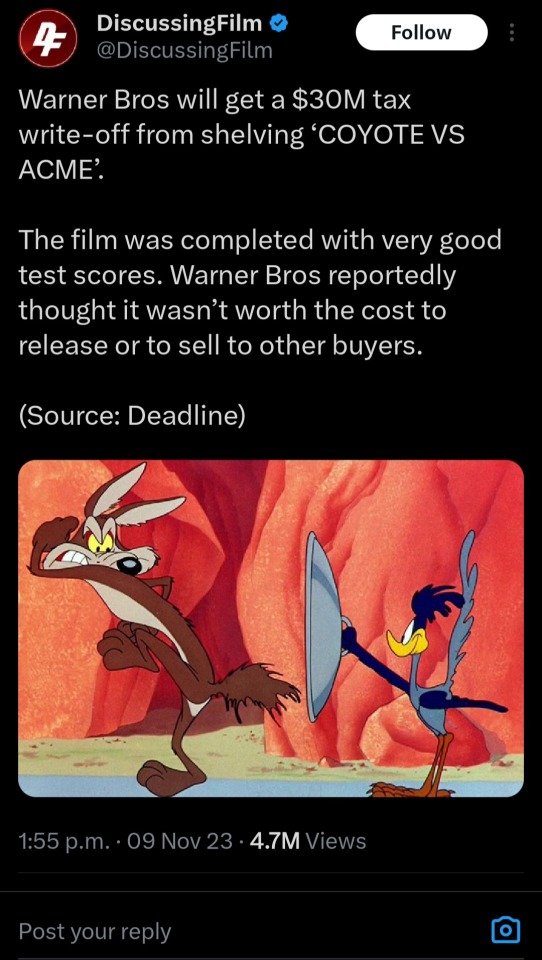
i can't believe it, i was looking forward to this movie for years. i was happy enough that my favorite looney tune was getting his own movie but the fact that it was COMPLETED and the people who have seen it say it was excellent just makes it that much more disappointing. shame on warner bros
#wile e coyote#road runner#coyote vs acme#coyote vs. acme#coyote vs acme movie#warner bros#warner brothers#looney tunes#cartoons#what on earth are they doing#this news is literally making me feel ill#of course david zaslav would shelve a movie about persistance in the face of corporate greed#what a disgrace to everyone who was involved in the film
589 notes
·
View notes
Text

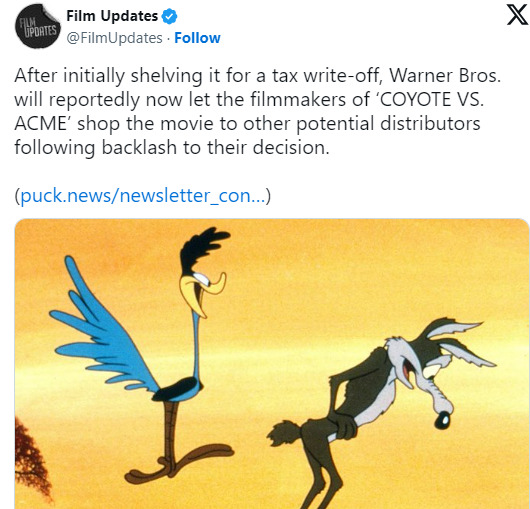



#warner bros#corporate greed#capitalism#coyote vs acme#animation#cartoon film#pop culture#david zaslav
19 notes
·
View notes
Text
Ugh, WB are shameless cunts. They cancelled Our Flag Means Death and now are using it to promote their streaming service.
I mean, 100% it's an adorable clip. That little smize Blackbeard gives Stede makes you want to giggle.
But, Zaslav, you cancelled the show, fucker. Because "it didn't have the numbers." And now you're like "Hey, you know a show everyone loves? This one!"
#Finish Our Stories#Our Flag Means Death#Save OFMD#OFMD#corporate bullshit#If you haven't heard about the ACME vs COYOTE thing look it up#Because Zaslav clearly doesn't see his employees as people
11 notes
·
View notes
Note
sebastian is like a looney toons villain if a looney toons villain was shoved into a fantasy post apocalypse
when i picture him chasing after anders wile e. coyote does come to mind
#if da2 had better graphics youd see the ACME CORPORATION printed on the starkhaven bow#theyre a dwarven guild
49 notes
·
View notes
Text
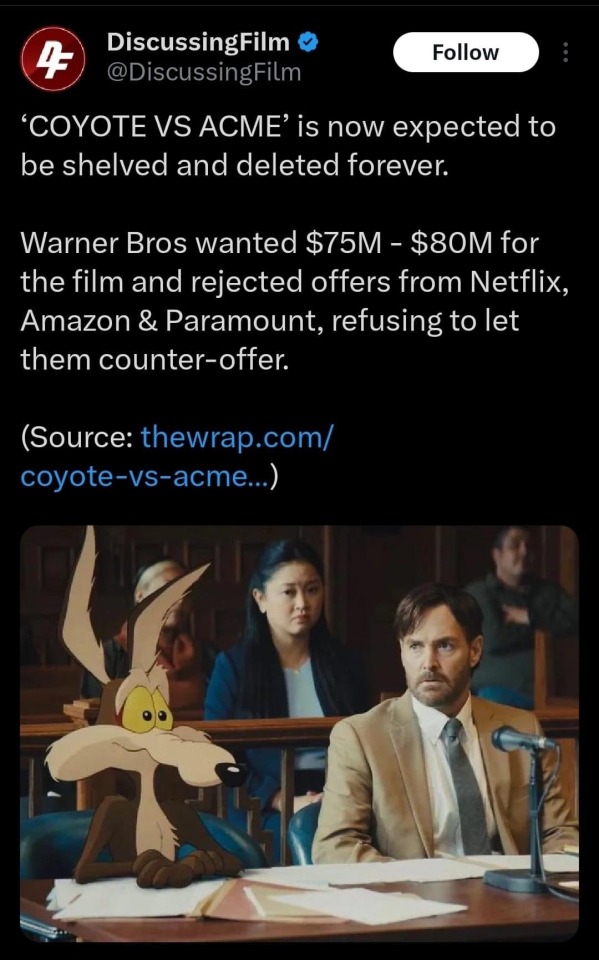
I can’t believe we’re losing a big budget Looney Tunes movie because of corporate greed.
9 notes
·
View notes
Text
I watched phantom of the paradise with my parents and only now am I realizing Winslow actually DID have dynamite in the record manufacturing plant! where did he get that?!?!?
#the first thing winslow does after getting out of sing sing is run to a payphone and call up the acme corporation#all joking aside they ended up really liking it!!!#my mom had the theory that winslow was undead after he fell into the river#I don't necessarily agree with that but I did think it was an interesting idea!#phantom of the paradise
7 notes
·
View notes
Text
So my wife went on a rabbit hole about Acme while we were watching Looney Tunes one night and she discovered that Acme was a common name for companies to use back in the day because of a few important reasons:
1) Acme means "peak" or "zenith" implying the best products (lmao)
2) Acme is pretty much guaranteed to be on the first page of the phone book
Therefore more people are buying product or services from "Acme" corporations, and with such a high volume of customers and the knowledge that you're in the prime spot of the phone book and will never run out of customers because of it, you don't really need to provide "quality" service, you just need to make something good enough that it isn't looked at too closely before purchase. That way, when it blows up, the customer is already twenty miles down the road and you're headed to the bank, secure in the knowledge that you'll live to make another customer into a fool.
Basically, every time you see Acme in an old cartoon or silent comedy, they are making the equivalent of a Wish.com joke on the products

#imagine my reaction when I saw a legit acme corporation out in the wild#it was acme roofing#do you want a roof from wish.com? i sure don't
31K notes
·
View notes
Text
concept:
supervillain × henchman with the twist that the supervillain is a sort of cartoon foppish dramatic gay villain with gonzo schemes and no bodycount. and the henchman is secretly a grimdark ultrapowerful Apex Predator supervilllain who came to Stake Out the competition. got mistaken for a henchman and found this so fucking funny hes just 100% committed to the bit.
hes carrying around boxes of fucking Acme Corporation sticks of dynamite. hes dressing in the matching stylish outfit. hes managing the other henchmen to execute gonzo schemes flawlessly. genuinely the most fun hes ever had in his life
his dumbass gay boss has literally no idea the lengths he is going to behind the scenes to make sure nobody interferes with any of this shit.
(apex supervillain, in his Supervillain Disguise. homoerotically and terrifyingly flirt/threatens flamboyant supervillain. smash cut to this poor man lying face down on a couch unpacking this with the very attentive henchman)
("hes going to eat me maybe????? but GOD that was the HOTTEST fucking thing thats ever happened to me. but i might DIE?? do u think he LIKES me...."
henchman: i think he does :3)
the ruse comes out when someone who the apex supervillain didnt catch comes to ACTUALLY challenge/harm his gay boss in public and apex supervillain is like. yeah no we're not doing this. time for the power of unfathomable violence.
gay supervillain promptly has a FULL MELTDOWN. oh my god the blood. and also. "you LIED TO ME???"
apex supervillain, apologetically: "I was waiting to see if you'd ever figure it out yourself. And the longer it went the funnier it got."
gay supervillain: "I TRUSTED you!! you were my BEST HENCHMAN"
apex supervillain: aw. past tense?
3K notes
·
View notes
Text

road runner has an important message!
#coyote vs acme#coyote vs. acme#road runner#roadrunner#wile e. coyote#wile e coyote#looney tunes#cartoons#looney tunes cartoons#warner bros#warner brothers#film#movie#animation#save coyote vs acme#release coyote vs acme#so ironic that his movie is about going against a greedy corporation when that is literally what is happening to this movie irl
37 notes
·
View notes
Text
How Google’s trial secrecy lets it control the coverage
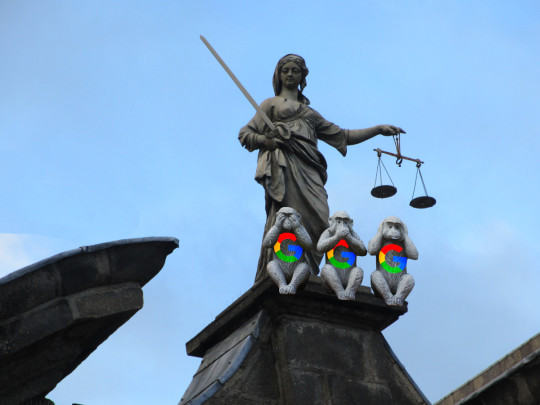
I'm coming to Minneapolis! Oct 15: Presenting The Internet Con at Moon Palace Books. Oct 16: Keynoting the 26th ACM Conference On Computer-Supported Cooperative Work and Social Computing.

"Corporate crime" is practically an oxymoron in America. While it's true that the single most consequential and profligate theft in America is wage theft, its mechanisms are so obscure and, well, dull that it's easy to sell us on the false impression that the real problem is shoplifting:
https://newrepublic.com/post/175343/wage-theft-versus-shoplifting-crime
Corporate crime is often hidden behind Dana Clare's Shield Of Boringness, cloaked in euphemisms like "risk and compliance" or that old favorite, "white collar crime":
https://pluralistic.net/2021/12/07/solar-panel-for-a-sex-machine/#a-single-proposition
And corporate crime has a kind of performative complexity. The crimes come to us wreathed in specialized jargon and technical terminology that make them hard to discern. Which is wild, because corporate crimes occur on a scale that other crimes – even those committed by organized crime – can't hope to match:
https://pluralistic.net/2021/10/12/no-criminals-no-crimes/#get-out-of-jail-free-card
But anything that can't go on forever eventually stops. After decades of official tolerance (and even encouragement), corporate criminals are finally in the crosshairs of federal enforcers. Take National Labor Relations Board general counsel Jennifer Abruzzo's ruling in Cemex: when a company takes an illegal action to affect the outcome of a union election, the consequence is now automatic recognition of the union:
https://pluralistic.net/2023/09/06/goons-ginks-and-company-finks/#if-blood-be-the-price-of-your-cursed-wealth
That's a huge deal. Before, a boss could fire union organizers and intimidate workers, scuttle the union election, and then, months or years later, pay a fine and some back-wages…and the union would be smashed.
The scale of corporate crime is directly proportional to the scale of corporations themselves. Big companies aren't (necessarily) led by worse people, but even small sins committed by the very largest companies can affect millions of lives.
That's why antitrust is so key to fighting corporate crime. To make corporate crimes less harmful, we must keep companies from attaining harmful scale. Big companies aren't just too big to fail and too big to jail – they're also too big for peaceful coexistence with a society of laws.
The revival of antitrust enforcement is such a breath of fresh air, but it's also fighting headwinds. For one thing, there's 40 years of bad precedent from the nightmare years of pro-monopoly Reaganomics to overturn:
https://pluralistic.net/ApexPredator
It's not just precedents in the outcomes of trials, either. Trial procedure has also been remade to favor corporations, with judges helping companies stack the deck in their own favor. The biggest factor here is secrecy: blocking recording devices from courts, refusing to livestream the proceedings, allowing accused corporate criminals to clear the courtroom when their executives take the stand, and redacting or suppressing the exhibits:
https://prospect.org/power/2023-09-27-redacted-case-against-amazon/
When a corporation can hide evidence and testimony from the public and the press, it gains broad latitude to dispute critics, including government enforcers, based on evidence that no one is allowed to see, or, in many cases, even describe. Take Project Nessie, the program that the FTC claims Amazon used to compel third-party sellers to hike prices across many categories of goods:
https://www.wsj.com/business/retail/amazon-used-secret-project-nessie-algorithm-to-raise-prices-6c593706
Amazon told the press that the FTC has "grossly mischaracterize[d]" Project Nessie. The DoJ disagrees, but it can't say why, because the Project Nessie files it based its accusations on have been redacted, at Amazon's insistence. Rather than rebutting Amazon's claim, FTC spokesman Douglas Farrar could only say "We once again call on Amazon to move swiftly to remove the redactions and allow the American public to see the full scope of what we allege are their illegal monopolistic practices."
It's quite a devastating gambit: when critics and prosecutors make specific allegations about corporate crimes, the corporation gets to tell journalists, "No, that's wrong, but you're not allowed to see the reason we say it's wrong."
It's a way to work the refs, to get journalists – or their editors – to wreathe bold claims in endless hedging language, or to avoid reporting on the most shocking allegations altogether. This, in turn, keeps corporate trials out of the public eye, which reassures judges that they can defer to further corporate demands for opacity without facing an outcry.
That's a tactic that serves Google well. When the company was dragged into court by the DoJ Antitrust Division, it demanded – and received – a veil of secrecy that is especially ironic given the company's promise "to organize the world's information and make it universally accessible and useful":
https://usvgoogle.org/trial-update-9-22
While this veil has parted somewhat, it is still intact enough to allow the company to work the refs and kill disfavorable reporting from the trial. Last week, Megan Gray – ex-FTC, ex-DuckDuckGo – published an editorial in Wired reporting on her impression of an explosive moment in the Google trial:
https://pluralistic.net/2023/10/03/not-feeling-lucky/#fundamental-laws-of-economics
According to Gray, Google had run a program to mess with the "semantic matching" on queries, silently appending terms to users' searches that caused them to return more ads – and worse results. This generated more revenue for Google, at the expense of advertisers who got billed to serve ads that didn't even match user queries.
Google forcefully disputed this claim:
https://twitter.com/searchliaison/status/1709726778170786297
They contacted Gray's editors at Wired, but declined to release all the exhibits and testimony that Gray used to form her conclusions about Google's conduct; instead, they provided a subset of the relevant materials, which cast doubt on Gray's accusations.
Wired removed Gray's piece, with an unsigned notice that "WIRED editorial leadership has determined that the story does not meet our editorial standards. It has been removed":
https://www.wired.com/story/google-antitrust-lawsuit-search-results/
But Gray stands by her piece. She admits that she might have gotten some of the fine details wrong, but that these were not material to the overall point of her story, that Google manipulated search queries to serve more ads at the expense of the quality of the results:
https://twitter.com/megangrA/status/1711035354134794529
She says that the piece could and should have been amended to reflect these fine-grained corrections, but that in the absence of a full record of the testimony and exhibits, it was impossible for her to prove to her editors that her piece was substantively correct.
I reviewed the limited evidence that Google permitted to be released and I find her defense compelling. Perhaps you don't. But the only way we can factually resolve this dispute is for Google to release the materials that they claim will exonerate them. And they won't, though this is fully within their power.
I've seen this playbook before. During the early months of the pandemic, a billionaire who owned a notorious cyberwarfare company used UK libel threats to erase this fact from the internet – including my own reporting – on the grounds that the underlying research made small, non-material errors in characterizing a hellishly complex financial Rube Goldberg machine that was, in my opinion, deliberately designed to confuse investigators.
Like the corporate crimes revealed in the Panama Papers and Paradise Papers, the gambit is complicated, but it's not sophisticated:
Make everything as complicated as possible;
Make everything as secret as possible;
Dismiss any accusations by claiming errors in the account of the deliberately complex arrangements, which can't be rectified because the relevant materials are a secret.

If you'd like an essay-formatted version of this post to read or share, here's a link to it on pluralistic.net, my surveillance-free, ad-free, tracker-free blog:
https://pluralistic.net/2023/10/09/working-the-refs/#but-id-have-to-kill-you

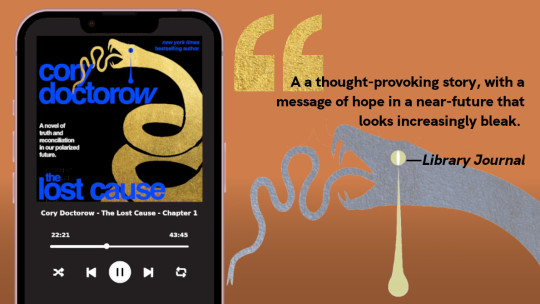
My next novel is The Lost Cause, a hopeful novel of the climate emergency. Amazon won't sell the audiobook, so I made my own and I'm pre-selling it on Kickstarter!

Image: Jason Rosenberg (modified) https://www.flickr.com/photos/underpants/12069086054/
CC BY https://creativecommons.org/licenses/by/2.0/
--
Japanexperterna.se (modified) https://www.flickr.com/photos/japanexperterna/15251188384/
CC BY-SA 2.0: https://creativecommons.org/licenses/by-sa/2.0/
#pluralistic#secrecy#opacity#google#antitrust#trustbusting#wired#working the refs#megan grey#semantic matching
2K notes
·
View notes
Text
This is so legit. My first thought after I heard about this was 'well I know who to never sell a creative project idea to.' Already took Netflix off my list years ago too, for always canceling much loved shows after season 2.
Warner Bros backpedaled so hard on the coyote vs acme situation because apparently after they announced that they weren’t gonna release it, a bunch of creatives called and cancelled their booked meetings and movie pitches with the studio to go other places.
After all, what’s the point of making a movie with Warner Bros when it’s more likely that they’re just gonna use it as a tax write off and never let it see the light of day?
#evil megacorp WB#git em boys!#coyote vs acme#business scam#corporate american hellscape#rare based moment from the US government
30K notes
·
View notes
Text

Ho ho ho.
Happy Everything,
Love,
The ACME Corporation Pumpkin Division
2K notes
·
View notes